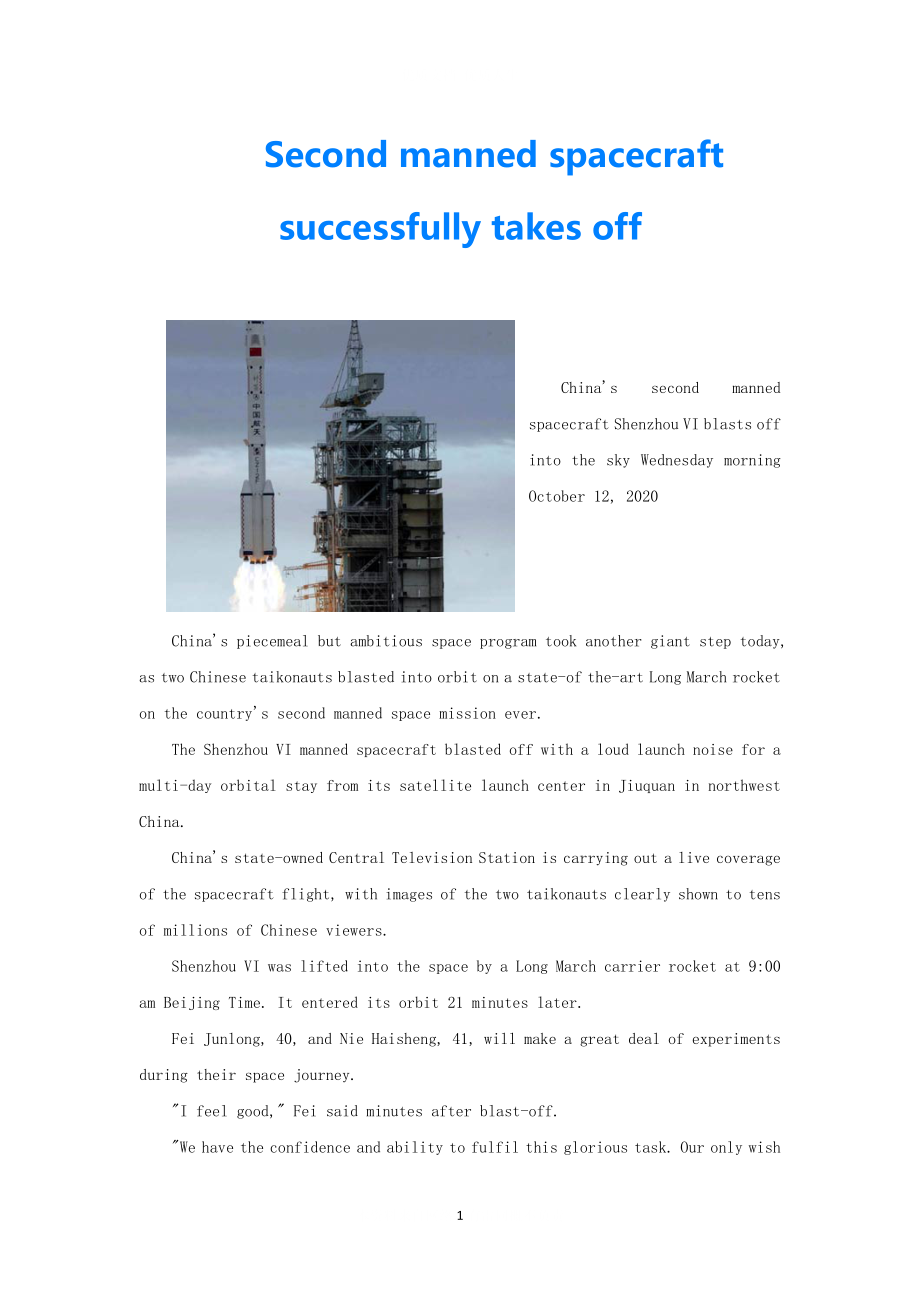《2021高中英語 Module5 Second manned spacecraft successfully takes off素材 外研版必修2》由會員分享��,可在線閱讀��,更多相關(guān)《2021高中英語 Module5 Second manned spacecraft successfully takes off素材 外研版必修2(3頁珍藏版)》請?jiān)谘b配圖網(wǎng)上搜索��。
1��、優(yōu)質(zhì)文檔 優(yōu)質(zhì)人生
Second manned spacecraft successfully takes off
China's second manned spacecraft Shenzhou VI blasts off into the sky Wednesday morning October 12, 2020
China's piecemeal but ambitious space program took another giant step today, as two Chinese taikonauts blasted into orbit on
2��、a state-of the-art Long March rocket on the country's second manned space mission ever.
The Shenzhou VI manned spacecraft blasted off with a loud launch noise for a multi-day orbital stay from its satellite launch center in Jiuquan in northwest China.
China's state-owned Central Television Stati
3��、on is carrying out a live coverage of the spacecraft flight, with images of the two taikonauts clearly shown to tens of millions of Chinese viewers.
Shenzhou VI was lifted into the space by a Long March carrier rocket at 9:00 am Beijing Time. It entered its orbit 21 minutes later.
Fei Junlong,
4��、40, and Nie Haisheng, 41, will make a great deal of experiments during their space journey.
"I feel good," Fei said minutes after blast-off.
"We have the confidence and ability to fulfil this glorious task. Our only wish is to make the mission a complete success," Fei said before boarding the cra
5��、ft. "Life in space is full of mysteries," Nie added.
"There is nothing to worry about," the two was quoted as saying before the launch as a light snow fell. "We will accomplish the mission resolutely. See you in Beijing."
Premier Wen Jiabao hailed the successful launch, reiterating China's poli
6、cy for peaceful use of space.
Wen said that China develops space technology purely for peaceful purposes and China is willing to cooperate with other nations in the development of space science and technology.
The launch came just a day after the ruling Chinese Communist Party wrapped up a key me
7��、eting to map out the development of the world's seventh-largest economy for the next five years.
In the Chinese capital, President Hu Jintao and Vice President Zeng Qinghong watched the lift-off at the Beijing Aerospace Command and Control Center.
China's first man is space was Colonel Yang Liwei
8��、, who orbited Earth 14 times in the Shenzhen V craft on October 15, 2020.
China, the third nation to put a man into orbit, insisted ahead of the launch that its aspirations in space were strictly peaceful and that it opposes deploying weapons there. Space officials say they hope to land an unmanne
9��、d probe on the moon by 2020 and launch a space station.
"We do not wish to see any form of weapons in outer space, so we reaffirm that our space flight program is an important element of mankind's peaceful utilization of outer space," Foreign Ministry spokesman Kong Quan said.
However, Washingto
10��、n sees China's space ambitions as an emerging security concern, with the potential for the Asian giant to boost its military capabilities and eventually challenge US dominance in space.
"US concern about China's space capabilities are first that China might eventually develop the ability to attack
11��、 US satellites, because the US military is heavily dependent on them," said Phillip Saunders of the Pentagon-linked Institute for National Strategic Studies.
"Second, as China space capabilities improve, it will have the ability also to improve its other military options," Saunders told AFP.
3
本資料來自網(wǎng)絡(luò)若有雷同概不負(fù)責(zé)
 2021高中英語 Module5 Second manned spacecraft successfully takes off素材 外研版必修2
2021高中英語 Module5 Second manned spacecraft successfully takes off素材 外研版必修2

